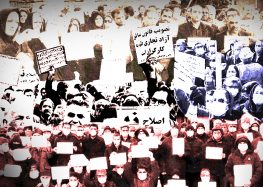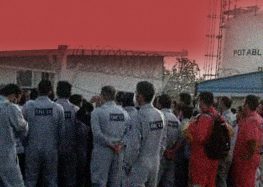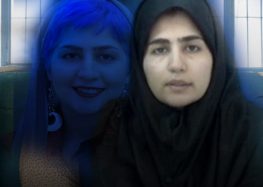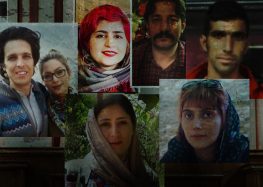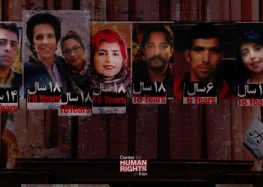Iran’s Judiciary Evades Responsibility for Lashing Sentences against Striking Miners
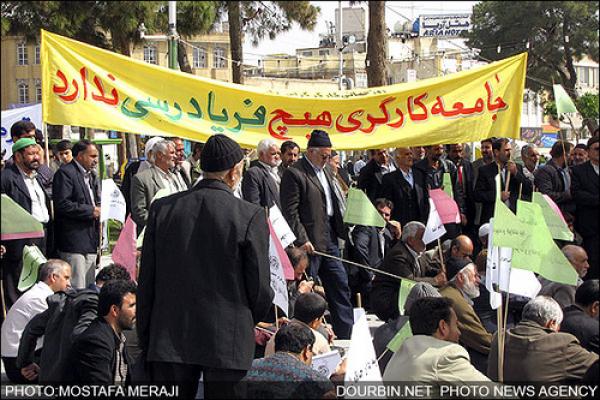
After a month-long silence amid widespread condemnation of the decision by Iran’s Judiciary to intervene in a local labor dispute and punish 17 protesting mine workers with lashing sentences, the Judiciary’s spokesperson has finally spoken out by evading responsibility for the ruling.
“It is possible that the judge’s taste does not match ours in some cases, and we don’t defend such tastes,” said Gholamhossein Mohseni Ejei, during a press conference on June 12, 2016, according to the semi-official Iranian Labor News Agency (ILNA).
Public outcry over the lashing sentences has meanwhile resulted in the dismissal of a Rouhani government official in charge of labor matters.
Traditionally, local labor councils have handled labor disputes in the Islamic Republic, but the Judiciary has been increasingly inserting itself into the disputes, and has been criticized for siding with employers.
Meanwhile, independent unions are not allowed to function in Iran, workers are routinely fired and risk arrest for striking, and labor leaders are prosecuted under national security charges and sentenced to long prison terms.
Asked by an ILNA reporter why the Judiciary has been entering labor disputes and siding with employers, Ejei said: “I categorically deny [the allegation] that we have entered union matters and that we have voted in favor of the employers, as we have repeatedly asked the Labor Ministry and government organizations to intervene in such cases in favor of the workers.”
Ejei did, however, acknowledge the Judiciary’s increasing involvement in labor disputes: “Where [actions] lead to social loss and crime, it shouldn’t be expected that the Judiciary would not enter,” he said.
The Judiciary’s dismissal of responsibility for the lashing sentences, which the United Nations has declared a cruel and inhumane punishment tantamount to torture, comes at a time of growing public outcry for accountability.
In fact, experts on Iranian law point out that the Judiciary should have put its weight behind the employees in the case involving the 17 mine workers.
“From a legal standpoint, the Judiciary can reach the conclusion that the punishment against these workers was unlawful and compensate them for the fines they were ordered to pay,” Farideh Gheyrat, a prominent lawyer based in Iran, told the International Campaign for Human Rights in Iran.
Workers Lashed for Protesting
On December 27, 2014 a large group of workers from the village of Agh Darreh in West Azerbaijan Province gathered in front of the Agh Darreh gold mine’s guardhouse to protest the firing of 350 workers. That same day one of the sacked workers attempted suicide and was taken to hospital, but ultimately survived.
The Pouya Zarkan Company, which operates the mine, sued 17 of the workers at the rally for “disrupting public order.” They were found guilty and sentenced to prison, lashings and fined up to five million rials ($164 USD) each.
The workers received a pardon from Iran’s supreme leader, Ali Khamenei, for their prison terms, but the lashings—between 30 and 100 per worker—were carried out.
Shortly afterwards a court in Yazd Province also sentenced a group of protesting workers from the Iran Central Iron Ore Company in the city of Bafgh to lashings on June 6, 2016.
Mohammad Jedari Foroughi, a lawyer representing nine of the accused workers in the Bafgh case, told ILNA that Branch 105 of the Second Criminal Court in Yazd had ruled that a rally for workers’ rights by his clients in 2014 had “disrupted order and prevented production” at the mine. The workers were sentenced to prison terms ranging from seven to 11 months and 30 to 50 lashes each. The court has suspended the implementation of the sentences for five years, but Foroughi said he would still file appeals.
Widespread Condemnation
On June 1, 2016 ILNA reported that the Minister of Cooperatives, Labor and Social Welfare Ali Rabiei had written to the prosecutor general to investigate the Agh Darreh case. He also removed West Azerbaijan’s labor affairs director, Reza Taghizadeh, from his post for being “uninformed about the lashing sentences carried out against the gold mine workers.”
“The government finds [the Agh Darreh] case regrettable,” said the Rouhani government’s spokesperson, Mohammad Bagher Nobakht, at a press conference on June 7, 2016. That same day Mohsen Sarkhoo, the chairman of the Tehran City Council’s Labor Faction described the lashings as “unprecedented” and called on the Judiciary to review the rulings.
If employers continue to bring criminal charges against workers simply for protesting, “the labor force would no longer feel secure” and ultimately production and profits would suffer, said Fathollah Bayat, chairman of the Contract Workers Union, on May 29, 2016.
On June 7 2016, the Islamic Labor Party issued a statement condemning the punishments: “After the lashing sentences for taking part in a union protest rally were carried out against the workers from the Agh Darreh gold mine, and the subsequent outcry from the labor community and popular organizations against the Judiciary for these punishments that are against the country’s labor laws as well as international conventions, we did not expect to see any more judges interfering in disputes between workers and employers.”
“Unfortunately, the lack of sufficient care in resolving these kinds of disputes has caused more protesting workers to receive lashing sentences, this time at the Bafgh iron ore mine,” said the statement.
Two labor organizations in neighboring East Azerbaijan Province—the Islamic Labor Councils Coordinating Committee and the Labor Unions Association—issued a joint statement on May 30, 2016 condemning the lashings and calling on the Judiciary to stay out of labor welfare disputes.
“Unfortunately, we have been witnessing workers being sued and punished for [being involved in] labor protests demanding better welfare and the implementation of labor laws in some cases,” said the statement.
“Employers are filing complaints with the Judiciary and building cases against this hardworking class,” continued the statement. “These cases undermine the principle of separation of powers between the three branches of state and marginalize workers to the point that they would not be able to demand dialogue within legal frameworks. These punishments violate international labor conventions.”
Previous Lashing Sentences
In April 2015 five workers from the Chador Malou iron ore mine in Yazd Province were sentenced to prison and lashings for “disturbing order and denying others the right [to work],” but their prison sentences were suspended and the lashings reduced to fines because they had no prior criminal record.
In September 2014 four workers from the Razi petrochemical plant in Bandar Imam Khomeini in southern Iran were also sentenced to six months in prison and 50 lashes each for “disturbing the peace” and “making insults and threats.” The employer accused the workers of provoking their colleagues to make “irrelevant demands unrelated to work” that forced the plant to shut down for several days.
In February 2009 two female labor activists—Sussan Razani and Shiva Kheirabad—were flogged 70 times and 15 times respectively for attending a rally marking International Labor Day on May 1, 2009 in Sanandaj, a city in Iran’s Kurdistan Province.

